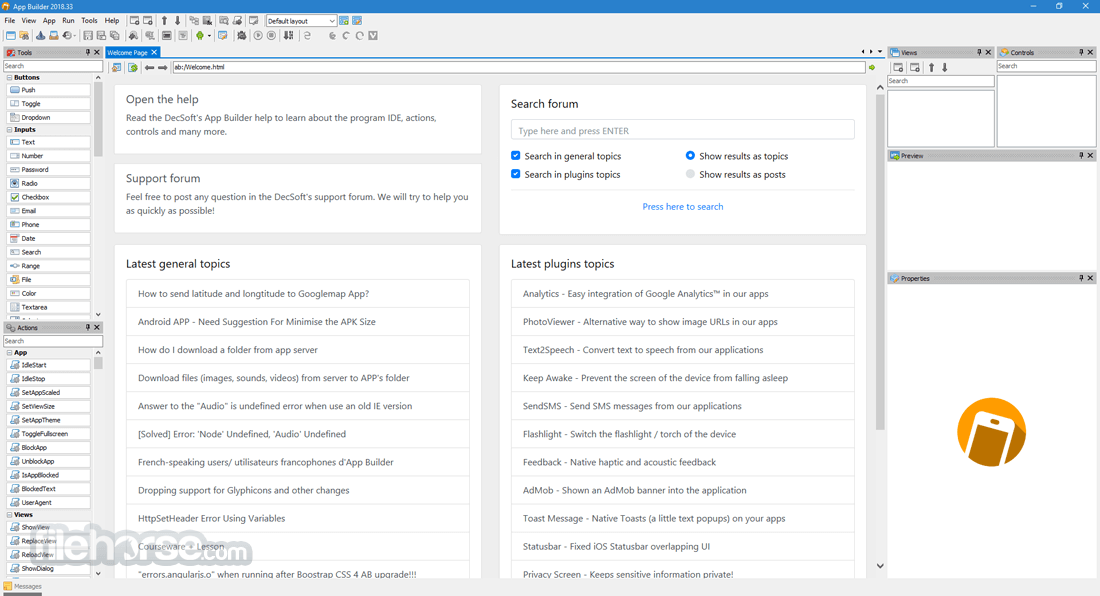-
Latest Version
-
Operating System
Windows 7 64 / Windows 8 64 / Windows 10 64 / Windows 11
-
User Rating
Click to vote -
Author / Product
-
Filename
appbuilder64.zip
-
MD5 Checksum
3b9c1fd149b3d49ef2dd27fa8a85b2d0
Sometimes latest versions of the software can cause issues when installed on older devices or devices running an older version of the operating system.
Software makers usually fix these issues but it can take them some time. What you can do in the meantime is to download and install an older version of App Builder 2023.39.
For those interested in downloading the most recent release of App Builder or reading our review, simply click here.
All old versions distributed on our website are completely virus-free and available for download at no cost.
We would love to hear from you
If you have any questions or ideas that you want to share with us - head over to our Contact page and let us know. We value your feedback!
What's new in this version:
- Mark the app.setVar() method as deprecated, that is, remove it from the Editor Quick Code List and the documentation, in favor of the new app.setReactiveVar() method. The app.setVar() continue to be available to use, but, it's recommended to move on to the new referred method to set app global reactive variables.
- Add the new app.setReactiveVar() method, which is the indicated to set app global reactive variables. This method replace the app.setVar() method, which continue to be available for compatibility purposes. Advanced users can also directly use the "app.store" property to set app global reactive variables like: app.store.MyVar = MyValue. Please take a look at the product help in order to understand the difference between app global reactive and app global non reactive variables.
- Add the new app.getReactiveVar() method, which can be used to retrieve the value of previously established app global reactive variables. Advanced users can perfectly use the app.store property to retrieve these variables like: app.store.MyVar, however, note that this method offer the ability to establish a default value to be returned if the variable did not exists. Please take a look at the product help in order to understand the difference between app global reactive and app global non reactive variables.
- Add the new method app.unsetReactiveVar(), which can be used to delete an existing app global reactive variable, so we can save precious resources for the app. Please take a look at the product help in order to understand the difference between app global reactive and app global non reactive variables.
- Add the new method app.setNonReactiveVar(), which is the indicated to set app global non reactive variables. We may need a global variable for the app, but, not required to be shown in the app interface, so we can use this method to create this kind of global variables, instead of reactive global variables, which consume a bit more resources. Advanced users can also directly use the "window.store" property to set app global non reactive variables like: window.store.MyVar = MyValue. Please take a look at the product help in order to understand the difference between app global reactive and app global non reactive variables.
- Add the new app.getNonReactiveVar() method, which can be used to retrieve the value of previously established app global non reactive variables. Advanced users can perfectly use the window.store property to retrieve these variables like: window.store.MyVar, however, note that this method offer the ability to establish a default value to be returned if the variable did not exists. Please take a look at the product help in order to understand the difference between app global reactive and app global non reactive variables.
- Add the new method app.unsetNonReactiveVar(), which can be used to delete an existing app global non reactive variable, so we can save precious resources for the app. Please take a look at the product help in order to understand the difference between app global reactive and app global non reactive variables.
- Add the previous referred new methods into the editor Quick Code List, and, update the product help in order to incorporate these new methods and some usage samples. Modify various existing samples apps in order to use the new methods instead the app.setVar() one or create by ourself a window.store variable, which is not created by the app to be available for us to store the app global non reactive variables.
 OperaOpera 117.0 Build 5408.39 (64-bit)
OperaOpera 117.0 Build 5408.39 (64-bit) PC RepairPC Repair Tool 2025
PC RepairPC Repair Tool 2025 PhotoshopAdobe Photoshop CC 2025 26.4 (64-bit)
PhotoshopAdobe Photoshop CC 2025 26.4 (64-bit) OKXOKX - Buy Bitcoin or Ethereum
OKXOKX - Buy Bitcoin or Ethereum iTop VPNiTop VPN 6.3.0 - Fast, Safe & Secure
iTop VPNiTop VPN 6.3.0 - Fast, Safe & Secure Premiere ProAdobe Premiere Pro CC 2025 25.1
Premiere ProAdobe Premiere Pro CC 2025 25.1 BlueStacksBlueStacks 10.41.661.1001
BlueStacksBlueStacks 10.41.661.1001 Hero WarsHero Wars - Online Action Game
Hero WarsHero Wars - Online Action Game TradingViewTradingView - Trusted by 60 Million Traders
TradingViewTradingView - Trusted by 60 Million Traders LockWiperiMyFone LockWiper (Android) 5.7.2
LockWiperiMyFone LockWiper (Android) 5.7.2










Comments and User Reviews